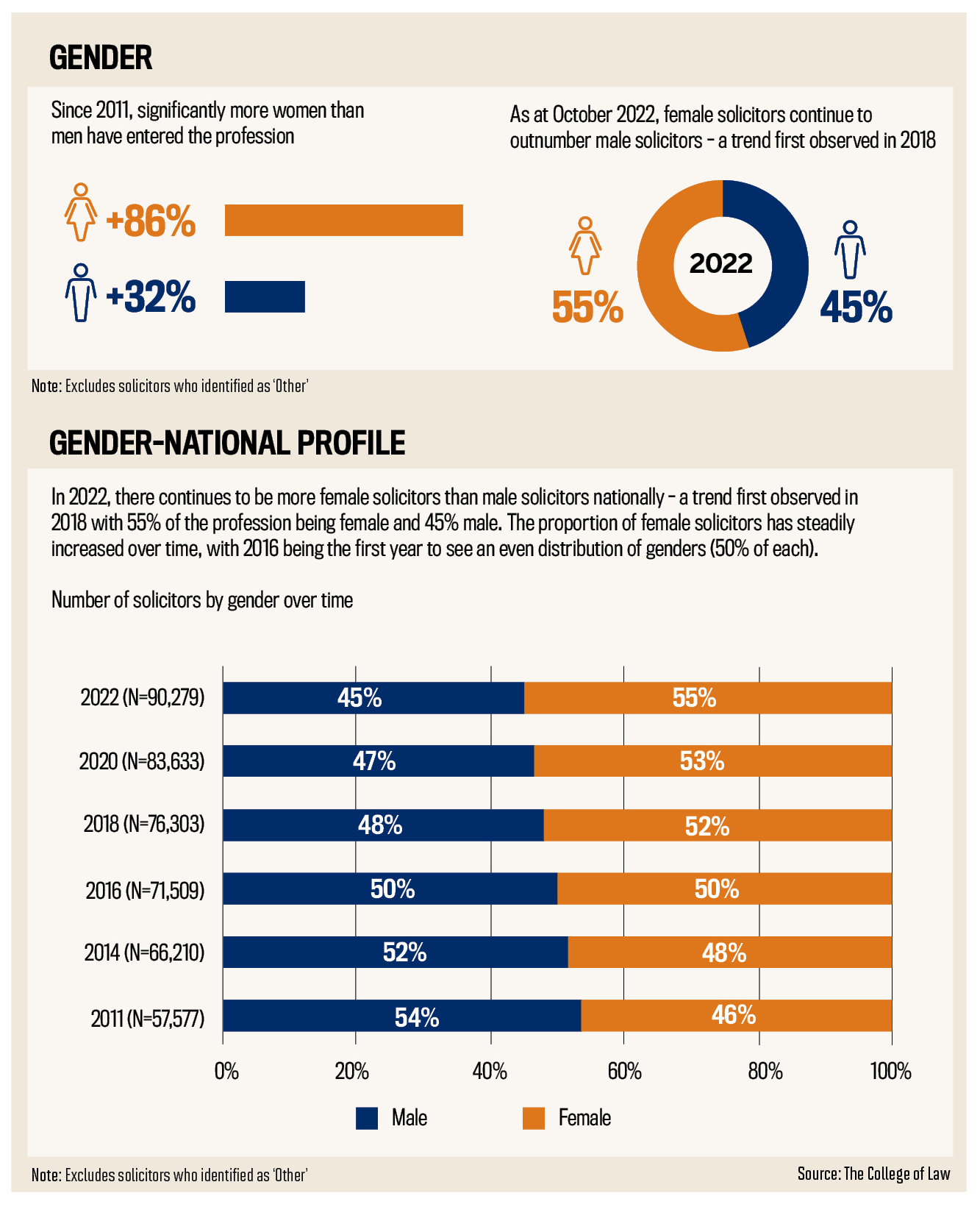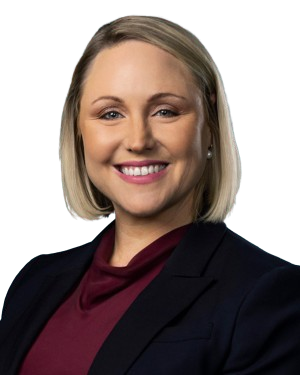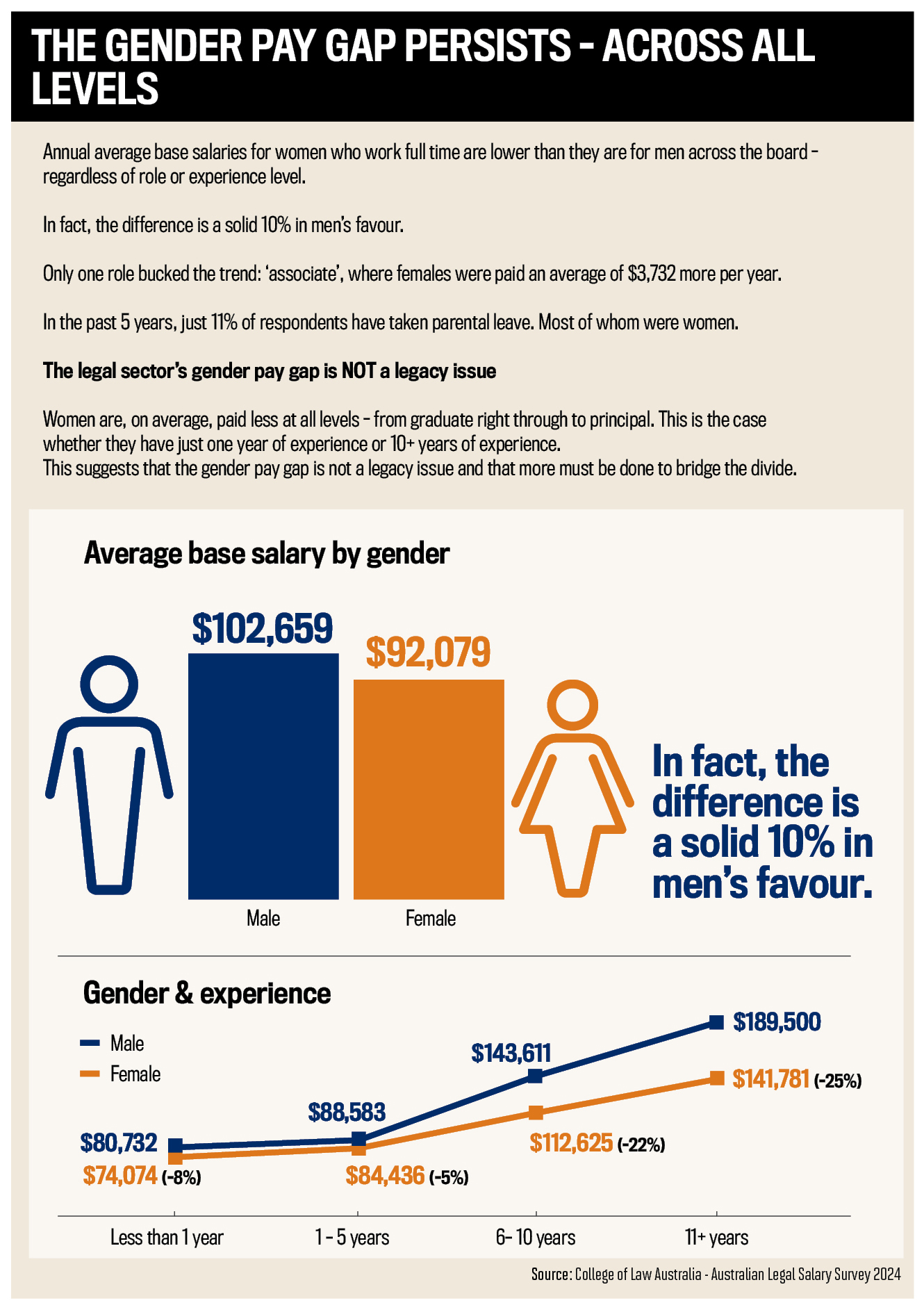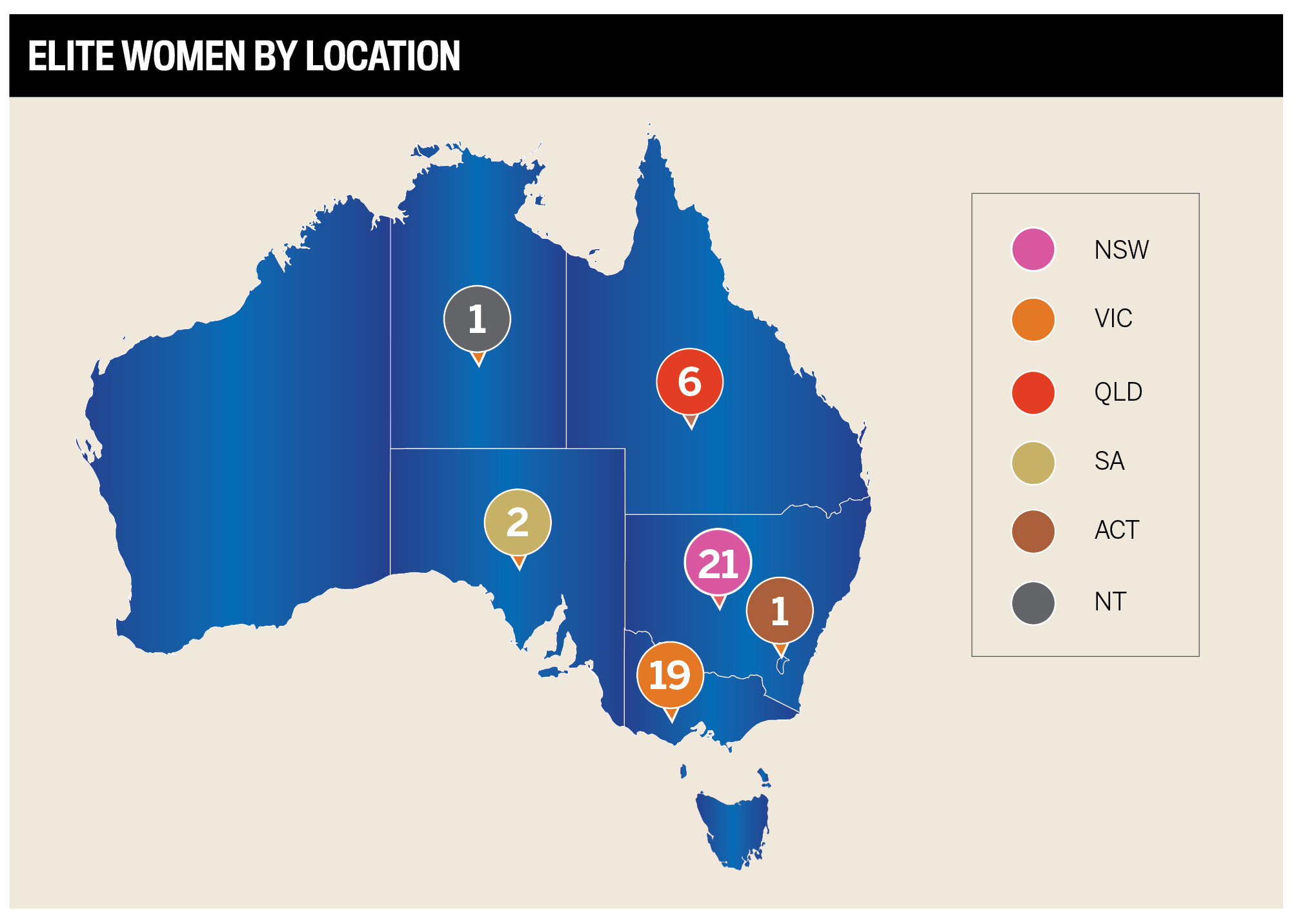

Jump to winners | Jump to methodology
Women are now the dominant force in the Australian legal industry. Back in 2011, they comprised 46% of lawyers, with parity reached in 2016, and by 2022, women made up 55%.
However, despite their numbers, the sector’s senior leadership roles are still dominated by men, which translates into earning potential.
Data from The College of Law shows:
Gender pay gap widens over 30: 59% of female solicitors earn less than $150,000 vs. 48% of males
28% of males earn over $200,000 compared to 19% of females
Women make up 53% of the profession, but 29% of women are partners/principals, compared to 54% of men
“Women are qualifying for access to senior roles because they are applying themselves, getting the runs on the board and have learned the importance of engaging with supportive networks,” says Ann-Maree David, executive director of The College of Law, Queensland. “However, systemic challenges remain at play. The fact that we do not yet see parity in senior roles confirms women are not being given improved access.”
Some of these themes are echoed by the Law Council of Australia, which earlier this year publicised that more needs to be done to eradicate sexual harassment and discrimination. They stated, “Gender imbalances in leadership, hierarchical and competitive workplace cultures and high alcohol consumption in professional settings (among other factors) contribute to a higher risk of sexual harassment. The profession needs to move away from traditional power structures and address underlying contributors.”
They have also had to contend with various issues dominating the sector over the past 12 months. These include a recognition of the profession being highly stressful along with the increased adoption of technology, most notably AI, with it estimated that one in two lawyers use “generative AI to perform day-to-day tasks”.
This gives even more credence to Australasian Lawyer’s Elite Women of 2024, who have made their mark by shaping the nation’s legal landscape as well as championing change in their respective fields.

The systemic challenges that hold women back include:
Gender bias: Implicit in hiring and promotion can disadvantage women, often leading to fewer opportunities for leadership roles.
Barriers to work-life balance: The demanding nature of legal work can clash with family responsibilities, which disproportionately affect women, especially those with young children. While many firms support remote working on a proportionate basis, proximity bias favours those who are physically present or can otherwise make their presence felt.
Networking barriers: Access to informal networks, which often influence career advancement, can be limited for women who juggle competing commitments, reducing their visibility and opportunities.
Mentorship and sponsorship: While it has become more common, in the promotion stakes, the most valuable mentors and sponsors are those senior lawyers who wield influence not only in the boardroom generally but in promotion rounds specifically. These connections can be difficult to achieve without introductions and/or proximity.
Representation: Women account for more than half of all solicitors who have been admitted for 10 years or less (53%) (compared with two in five male solicitors (41%)) but remain underrepresented in senior positions and partnerships, which perpetuates the challenges for future generations.
Pay inequality: Gender pay gaps persist in the legal arena, affecting job satisfaction and long-term career planning. The growing number of women moving from private practice into the corporate or government sectors, which demand transparency, speaks to this.
“The culture and work practices within legal practice in Australia haven’t changed markedly in the last 100 years,” says David. “Those structural underpinnings were created by men for men and represent one of the greatest barriers to women building sustainable legal careers.”
“More and more women lawyers are building successful careers on their own terms,” says David.
That is evidenced by AL’s Elite Women, displaying remarkable passion, dedication and resilience in their roles.
Shauna Mounsey is a qualified environmental scientist, a former political advisor, has dabbled in PR and opened an MMA gym.
As senior legal counsel with Darwin-based firm Source Legal, Mounsey provides expert in-house legal support to businesses across a range of sectors.
“I don’t care what other people’s standards are; I set my own. I don’t let other people define what I should or shouldn’t be,” she says.
“I run our data privacy practice, which included building a new SaaS module with a cybersecurity vendor. I am always looking to see where we can value add for clients.”


Principal and director at Construction Legal, Jessica Rippon, has over two decades of experience in building and construction law.
Her determination has pushed her to the forefront of a male-dominated sector.
“If you want to succeed, you need to be resilient, work hard and have grit and passion,” says Rippon.
“I am a strong believer in making people think and present solutions, and then I will work through the solutions with them, and if they get it wrong, teach them through examples.”


Over 20 years as a lawyer, Breellen Warry joined Maddocks as a partner in 2021, working mainly with the New South Wales government on environmental matters.
“I've always been pretty tenacious, and that has helped me have success,” says Warry.
“I wouldn’t describe myself as a terrific black letter lawyer, but I’ve always understood the business of law, the importance of client service and drilling that into my team.”


Director of Fletcher Clarendon, Ann-Maree Ventura, began her career as an accountant before realising she had a passion for tax issues.
“I work in corporate law, but that doesn't mean that I can't also help with important causes that are dear to my heart. I help a lot of organisations with pro bono work and volunteering,” she says.
“I lead with kindness. I let junior lawyers know there’s nothing they can’t fix, and if they make mistakes, they’re not going to get in trouble. It’s about empowering them to take control of something and find a way to fix whatever has happened.”


Bianca Seeto, executive manager and partner at Citation Legal, has always had a passion for employment law and workplace relations.
“I genuinely love people, and as a leader, I’m very approachable. I always aim to find out what motivates my team, and if you align with their goals, you get wonderful results.”
Seeto’s proudest achievement is providing flexible work through a new initiative.
She says, “It’s something I’m very passionate about. We call it our ‘flying team’, who are 36 experienced casual workers who want to pick the hours they work at the rates that suit them. They’re people that probably would have left if they had not had that flexibility, so it’s a win-win situation.”


Despite significant strides over the past decade, the Australian legal industry has yet to reach gender equity at the leadership level.
According to an Australian Legal Salary Survey 2024 by The College of Law Australia, annual average base salaries for women who work full-time are lower than they are for men across the board, regardless of role or experience level.

Early in Mounsey’s career, she was denied a pay raise in favour of her male counterpart.
She says, “My boss came to me and said he couldn’t give me a pay raise because my male coworker was getting married, and I told him I was already married, and he responded, ‘You have a husband to support you’.”
Female lawyers’ careers can unfairly suffer for many reasons, even for deciding to have a family.
Mounsey says, “I had one male lawyer come up to me and say, ‘Shauna, you’re 26 now and married, so you only have two years to get your practice up and running because you’re going to have children soon and your career will be over’. The Northern Territory is progressing a lot, but I’ve had judges question why I’m wearing pants in a courtroom and not a skirt.”
Rippon is a subject matter expert in government reform and consumer protection and sits on the NSW Building Commission’s Ministerial Advisory Panel.
“There’s more to be done in the space of gender equality. When I was appointed to the panel, 11% were female; I was one of three. I thought we had been championing change for a long time, and that representation was poor,” she says.
Rippon also believes there are preconceived ideas.
She says, “For those that first met me when I had a male colleague, they’d gravitate towards him. I picked my time to speak, and when I did, they knew what I was talking about. It still happens to me today, and it probably won’t change until this new generation dominates the workforce and the older people start retiring.”

Warry believes firms need to support women more, especially when going on parental leave.
“They need to ensure that they’re not starting from scratch when they return. There are a lot of women who decide not to pursue partnerships because they have small children; it’s incumbent on firms to provide that support to allow them to do both,” she says. “It should be across the board, where both men and women are encouraged to take parental leave and feel supported when they return.”
Melbourne-based winner Ventura believes there can be a stigma for women when dealing with clients.
She says, “Perhaps it’s being softly spoken and not as authoritative, as a man might be, but sometimes you need to work a little bit harder with some clients to demonstrate that you’ve got the skills that they need.”
Ventura insists the industry needs to do more to keep women in the industry.
“It starts out imbalanced as there are more women than men at university, but as time goes on, there’s a lot more men at the leadership level. People leave because they just can’t get that balance between work and family life,” she says. “Providing flexibility is key to retaining women in that part of their life.”
Seeto echoes that sentiment.
She says, “It used to upset me that talented young female lawyers thought they couldn’t balance having a family and a practice. I’m proud that we have established a flexible workplace where you can work your own hours, because as long as clients are happy, we’re successful.”
Industry expert David highlights policies that firms should implement to enable women to thrive:
Gender equity targets: Peak body Chief Executive Women promotes 40% as a viable target for women in leadership, which allows some measure of flexibility in appointments and recruitment. Without agreed, transparent targets, there can be no accountability.
Formalised and transparent recruitment and promotion assessments: Even women with a sponsor at the partnership table may not get the support they need because their sponsor is less influential than others at that table.
Policies and infrastructure that foster inclusivity: Support for childcare, remote work and flexible work.
In July, Australasian Lawyer invited legal professionals from across the country to nominate exceptional female leaders for the fourth annual Elite Women list. Nominees had to be working in a role related to the legal profession, have influenced the profession in a way that demonstrated a passion for the law and have never been recognised on the Elite Women list.
Nominators were asked to provide details of their nominee’s achievements and initiatives over the past 12 months, including specific examples of their professional accomplishments and contributions to the industry as a whole.
To narrow down the list to the final 50 Elite Women, the AL team reviewed all nominations, examining each individual’s meaningful contribution to the profession.